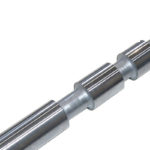If you’ve been around the hydraulic world for a while, you’ll have noticed there is a price discrepancy between various component manufacturers. Whether there is a correlation between price and quality is a discussion unto itself, but regardless, you can’t argue the price range is vast. Let’s assume for this missive that higher priced components […]
9 dumb mistakes people make when designing fluid power systems
Sometimes dumb is relative. Was Einstein dumb because he brushed off quantum entanglement as “spooky action at a distance?” He was wrong, of course, because two entangled subatomic particles can travel away from each other in opposite directions for a million years, and when one finally hits something, the other is immediately affected as well. […]
What is electronic control in fluid power?
Hydraulic valves operate most commonly in one of three ways; mechanical/manual control, pilot control or electric control. Mechanical control involves something physical pushing on the valve, such as with a roller or cam, which itself shifts the spool or poppet. Manual control was long the king of valve control, especially with mobile hydraulics; they’re inexpensive […]
Where do you locate fluid power components?
We at Fluid Power World write many articles about fluid power components, but less often do we write about where these components are located in a system. You can find in our pages/on our websites what a transducer is, what a relief valve is and what a flow control is, but you will find fewer […]
He uses a relief valve as a flow control. You won’t believe what happens next
I’ll admit, I’ve fallen prey to one of these “you won’t believe what happens next” taglines floating around Facebook and other social media sites. If you’ve never seen them, hopefully mine suckered you in. Because you won’t believe what happens next. I’ve actually seen a relief valve used in place of a flow control, and […]
Using your senses to better understand your system
By Josh Cosford, Contributing Editor Sensors used in fluid power are available to measure anything from pressure, flow, temperature, position and more. Understanding their differences will help you better maintain an efficient system. Sensor is a rather arbitrary word as it relates to the observation or measurement of fluid power characteristics. Anything that can sense […]
Where do you use heat exchangers?
ONE of the critical conditioning requirements of hydraulic fluid is that it is maintained at an optimal operating temperature. As oil temperature drops, the viscosity of the fluid increases, making it more difficult to pump, creating higher pressure drop and increasing the chance of cavitation. As oil temperature increases, the viscosity of the fluid decreases, […]
The top 7 reasons that hydraulics will be around in another century
In some ways, hydraulics is an ignored technology. The research dollars going into fluid power is miniscule compared to electronics, and although it’s partly because hydraulics is a mature industry, I don’t foresee this changing any time soon. Regardless, the benefits of hydraulics are high, so it will always have a place in our world, […]
Ag machinery relies on the versatility of hydraulics
Unique, easily changed designs dominate in agricultural machines, where the power density and the precision offered by electrohydraulics will continue to keep farms in the green. The agricultural machinery industry has probably been the slowest evolving sector with regards to electronic integration. It’s not that machine manufacturers haven’t kept up to date with the latest technology; […]
Top 10 reasons why hydraulics suck
Hydraulics are brutal. Here are my top reasons you should stay away from hydraulics at all costs. 10. Hydraulics are dirty. With all that oil everywhere, it gets in your clothes and under your fingernails. Oily hydraulic machines collect dirt and dust like the back of your fridge. 9. Hydraulics are complicated. There are so […]










